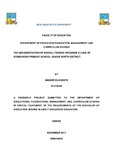Please use this identifier to cite or link to this item:
https://cris.library.msu.ac.zw//handle/11408/4014Full metadata record
| DC Field | Value | Language |
|---|---|---|
| dc.contributor.author | Mashiri, Elizabeth | - |
| dc.date.accessioned | 2020-12-11T11:43:24Z | - |
| dc.date.available | 2020-12-11T11:43:24Z | - |
| dc.date.issued | 2017-11 | - |
| dc.identifier.uri | http://hdl.handle.net/11408/4014 | - |
| dc.description.abstract | The study focused on the implementation of the school feeding program recently introduced by the Government of Zimbabwe through the Ministry of Primary and Secondary Education to provide supplementary feeding to primary school children especially those in rural areas, who are worst affected by shortage of food. Persistent drought over the years have left a lot of children being affected resulting in massive school dropouts drawing the attention of government and forcing it (government) to act. Government contribution was to the extent of providing maize for mealie meal leaving schools to work out mechanisms for provision of other ancillaries and the preparation of food. The objectives of this study were to determine the level of implementation of the school feeding program in schools, level of community contribution and participation in the program, an assessment of the level of hygiene maintained during implementation of the program and finally to assess level of environmental challenges arising from implementation of the program and mitigation measures put in place. Both quantitative and qualitative approaches to research were used in the study. A sample size of 46 respondents was used. Primary data was collected through a questionnaire from the sample selected using purposive sampling technique on the basis of previous experience of working together in some other projects. Data analysis was done and presented in the form of tables, bar charts and pie charts. The findings were that the community fully appreciated the government initiative of providing their children with food and showed this appreciation by participating fully in the program. The study showed that there was awareness of the need to uphold the highest standard of hygiene as well as an appreciation of the impact of implementation of the program on the environment. The research revealed that there was a need to educate the community on issues of hygiene and the environment. The research recommends further research to be undertaken on the mpact the program has had on attendance and performance of pupils in schools | en_US |
| dc.language.iso | en | en_US |
| dc.publisher | Midlands State University | en_US |
| dc.subject | implementation | en_US |
| dc.subject | school feeding program | en_US |
| dc.title | The implementation of school feeding program : a case of Nyamuroro Primary School, Gokwe North District | en_US |
| dc.type | Thesis | en_US |
| item.grantfulltext | open | - |
| item.fulltext | With Fulltext | - |
| item.languageiso639-1 | en | - |
| item.cerifentitytype | Publications | - |
| item.openairecristype | http://purl.org/coar/resource_type/c_18cf | - |
| item.openairetype | Thesis | - |
| Appears in Collections: | Bachelor of Education in Early Childhood Education | |
Files in This Item:
| File | Description | Size | Format | |
|---|---|---|---|---|
| Preliminary School Feeding Project..pdf | Full Text | 703.49 kB | Adobe PDF |  View/Open |
Page view(s)
392
checked on Dec 21, 2025
Download(s)
218
checked on Dec 21, 2025
Google ScholarTM
Check
Items in MSUIR are protected by copyright, with all rights reserved, unless otherwise indicated.



